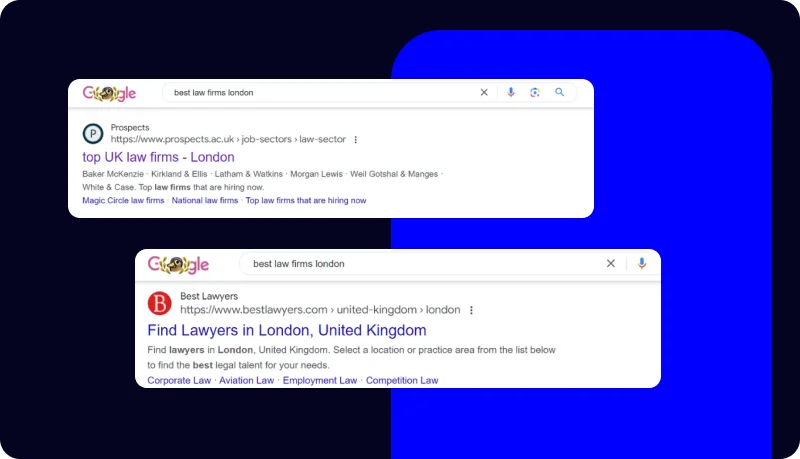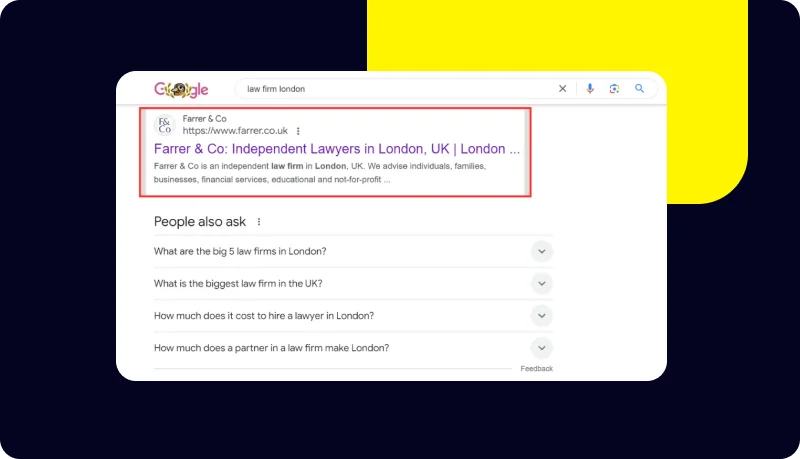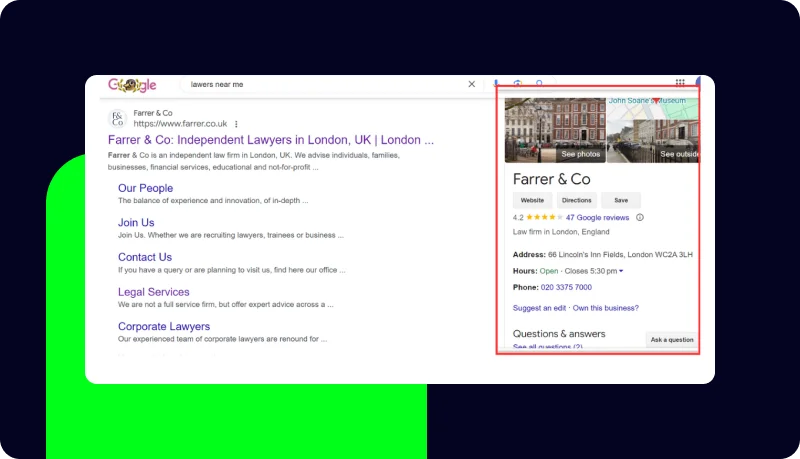Your Guide to Law Firm Lead Generation
Here’s how to get more clients for your firm in the digital age.
Your law firm needs a steady flow of clients to stay in business.
While reputation is important, you can’t rely on it alone in today’s digital landscape.
As you know, competition is tough, and law firms need to stand out with a strong online presence if they’re going to survive. Even if your firm has been operating for generations, newer firms with a better digital presence can start to take over your clients.
After all, 75% of lawyers realise their website is their most effective marketing tool. So, investment in digital marketing has become a top priority for all firms. If you’re not keeping up, you’ll soon fall behind.
Ultimately, law firm marketing all comes down to having a successful lead generation process – something you need to be doing online.
To help you get this right, here’s everything you need to know about lead generation for law firms and how to do it.
Understanding Law Firm Leads
A law firm lead is simply a potential client who has shown interest in your legal services. This could be someone filling out an enquiry form on your website, calling to ask about your practice, or requesting more information from you.
Essentially, if someone engages with your firm and provides contact details, they become a lead.
Leads are a crucial part of the client journey. This journey typically follows three key stages.
Intake
Intake begins as soon as a lead contacts your firm. How you manage this stage can significantly impact whether the lead becomes a paying client.
Efficient intake processes, supported by software, ensure that you capture their details and follow up promptly. Without proper systems in place, there’s a risk of missing opportunities, especially if leads are not responded to quickly.
We see this happen with far too many law firms that rely on outdated marketing processes. They waste a vast amount of demand (potential clients) by simply not capturing this demand at the right moment
Active Matter
Once a lead becomes a client by signing a fee agreement, the case becomes an active matter.
This is where the client officially hires your firm to represent them. Communication and progress updates during this stage are crucial to client satisfaction.
Former Client
After the case concludes, the client becomes a former client. However, former clients can still generate value through repeat business or referrals.
Keeping in touch with them ensures your firm stays top-of-mind for any future legal needs.
In short, understanding and managing your leads effectively is key to securing new clients and growing your law firm. By using systems to track and engage with leads, you can turn interest into ongoing business.
Understanding Law Firm Lead Generation
Law firm lead generation is the process of attracting potential clients to your firm in the first place.
Initially, it’s about maximising the “intake” step listed above. Although, effective lead generation for law firms also involves engaging these leads, nurturing their interest, and eventually converting them into paying clients.
To get this right, you need a streamlined customer journey, or lead generation funnel.
By initiating a range of marketing strategies, firms can consistently bring in new prospects and move them through the stages of a lead generation funnel. Let’s break down what this looks like.
The Lead Generation Process
The entire lead generation process for law firms typically follows four main stages. Each stage plays a crucial role in guiding leads closer to becoming clients.
Awareness
This is the first step, where potential clients become aware of your firm. When we talk about lead generation for law firms, generating awareness is the first thing you need to get right.
This can happen through strategies like running online ads, social media, or search engine results. You can generate awareness through organic or paid marketing.
The focus here is to make your law firm as visible as possible. Good marketing and SEO practices are essential in this stage, as first impressions count. You want to ensure prospects know who you are and what you offer.

Interest
Once prospects know about your firm, you need to capture their interest. They’ll start looking at your website, reading your content, or perhaps subscribe to your newsletter.
This stage is all about providing value and showcasing your expertise. You might offer free consultations, legal guides, or testimonials to encourage them to take the next step.
The key element here is building trust, and showing prospective customers that your firm should be their first choice.
Decision
At this point, the prospect is weighing their options and deciding whether to hire your firm. You need to stand out from your competitors by highlighting how you can meet their needs.
A strong client intake process, clear communication, and personalised follow-ups can help tip the decision in your favour. Make it easy for them to choose you by being responsive and helpful.
Remember, the legal space is highly competitive. If your firm isn’t making a strong case, you’ll lose interested clients to your competitors.
Action
The final step is where the lead takes action – this could mean booking a consultation or signing up for legal services.
At this stage, it’s important to make the process smooth and professional. Clear calls to action on your website, well-structured landing pages, and timely responses all contribute to a successful conversion.
It’s important that your firm applies ongoing conversion optimisation across its site to consistently improve this step.
when all four stages of the law firm lead generation process work seamlessly together, you’ll be able to generate a lot more demand for your firm and turn that demand into clients.

How to Generate Leads for Law Firms
Generating leads for law firms requires a strategic mix of digital and traditional marketing methods.
Here are some of the most effective strategies to help your firm generate high-quality leads and grow its client base.
1. Optimise Your Website for SEO and User Experience
Your website is the cornerstone of your digital presence and often the first place potential clients will evaluate your services.
Over 95% of people needing legal advice start their search online. So, if your law firm SEO performs well, you’ll have a major advantage in the awareness stage of the lead generation journey.
Researching keywords is essential for a strong SEO presence. Beyond this, technical SEO is equally important.
Make sure your website loads quickly, is mobile-friendly and has a clean URL structure. Search engines favour sites with a strong technical foundation, improving your chances of ranking higher in search results. Use internal links to direct users to related content and external links to build credibility.
Although, this is only just the tip of the SEO iceberg. When it comes to building a strong organic presence for your law firm, you’ll be working in a highly competitive space. So, partnering with law firm SEO experts is key to gaining a competitive advantage.
And when it comes to SEO, remember that it’s a marathon, not a sprint. Optimising your firm’s organic visibility takes time – it should never be a ‘set-it-and-forget-it’ type of approach.
Also, focus on user experience (UX). Visitors should be able to navigate your site easily, find relevant information, and feel confident about contacting your firm.
Use clear calls-to-action (CTAs) on key pages like the homepage, blog, and service pages. Adding chatbots can also assist in converting casual browsers into qualified leads by offering immediate responses to common queries.
Very importantly, you need to establish trust and credibility on your site. This could involve adding testimonials, positive reviews, or awards. Without establishing trust, the traffic you generate may never get any further than your homepage.

2. Leverage Paid Advertising
Paid advertising, such as Pay-Per-Click (PPC) and display ads, can drive immediate traffic to your website.
With Google Ads, you can bid on keywords relevant to your services, ensuring your firm appears at the top of search results when potential clients are actively looking for legal help.
This is a fast and efficient way to drive awareness, and on of the most valuable tactics for law firm lead generation. To get this right, it’s important that you understand what a profitable cost per lead (CPL) is, so that you can optimise your ad spend not to exceed this.
The key to successful PPC campaigns is also in targeting. Platforms like Google and Facebook allow you to narrow your audience based on location, interests, and search behaviour.
For law firms, it’s crucial to geo-target your ads to focus on potential clients in your region. For instance, if you’re a solicitor in Manchester, you want your ads to appear only to those within the surrounding areas who are likely to use your services.
Equally important is ad performance tracking. Use metrics like Cost Per Click (CPC), conversion rates, and click-through rates (CTR) to determine the success of your campaign. Adjust your targeting, ad copy, and budget based on performance data.
Over time, you can fine-tune your strategy to ensure you’re attracting high-quality leads at the lowest possible cost.
Ultimately, a powerful lead generation engine for your firm should combine both PPC and SEO so that you have a solid organic and paid presence.

3. Social Media Marketing and Engagement
Social media is more than just a platform for posting updates – it’s a dynamic tool for building relationships, engaging with potential clients, and increasing brand awareness.
The key is to post content that adds value to your audience. Share articles, blog posts, legal updates, and tips that answer common legal questions. This is all about spreading your scope of awareness.
Another powerful tool is social media ads. Unlike PPC, social media ads are ideal for both awareness and lead generation.
You can run targeted campaigns to promote specific services, free consultations, or downloadable guides in exchange for email addresses. Engage with users who comment or message your page, and nurture these interactions to turn leads into clients.
4. Claim and Optimise Your Google Business Profile
A Google Business Profile is essential for any law firm. It increases your visibility in local search results and helps build trust.
When potential clients search for legal services in their area, they are likely to click on firms that appear in the local pack – the top three listings that Google shows for location-based searches.
To optimise your Google Business Profile, ensure all details are accurate, such as your firm’s address, phone number, services, and opening hours. Regularly update it with new photos, and most importantly, encourage satisfied clients to leave positive reviews.
Client reviews are a significant ranking factor for local search, and they influence potential clients’ decisions. Respond to all reviews, positive and negative, as this shows potential clients that you care about customer service.
Google also offers Local Services Ads (LSAs), a pay-per-lead advertising platform.
Unlike traditional PPC, LSAs charge you only when a potential client contacts you through the ad, making it a cost-effective option for firms wanting to capture high-quality leads.

5. Networking and Referrals
While digital marketing is crucial, don’t underestimate the value of in-person networking.
Attending local events, legal conferences, and seminars allows you to build relationships with other professionals who may refer clients to your firm. Consider speaking at industry events to showcase your expertise.
Word-of-mouth referrals remain one of the most trusted sources for new business. You can encourage current clients to refer their friends, family, or colleagues by offering a referral incentive or simply asking for a recommendation after a successful case outcome.
Additionally, professional partnerships with accountants, financial advisors, and other law firms can help expand your referral network.
6. Marketing Automation and Email Campaigns
Email is one of the best ways to move leads through your funnel, warming them up, and turning them into clients.
Automating your marketing efforts saves time and ensures consistent communication with potential clients.
Email marketing is particularly effective for nurturing leads who aren’t ready to hire a lawyer immediately. You can offer valuable resources like legal guides, FAQs, or newsletters in exchange for their contact details.
Segment your email list based on the type of service they’re interested in, their location, or their stage in the buyer’s journey. This allows you to send personalised content that speaks directly to their needs.
For example, someone who downloaded a guide on estate planning may be more interested in an email series on wills and probate, while a business owner might be interested in corporate legal services.
7. Offer Free Consultations
Offering a free initial consultation can be a powerful lead-generation tool. Many clients hesitate to reach out to a lawyer because they fear high fees or uncertainty about what to expect.
A free consultation removes that barrier and gives you the chance to demonstrate your value in a low-pressure environment.
To maximise the effectiveness of this approach, ensure you have a structured process for handling these consultations.
Provide value during the meeting by addressing their concerns, outlining possible legal strategies, and building trust. After the consultation, follow up with a clear proposal and timeline to keep the lead engaged and moving toward becoming a client.
Building Trust, Building Business
Simply having a good website isn’t enough – you need to have a strategic lead-generation process and customer journey in place. Understanding the different stages of law firm lead generation and how your digital channels work together is essential for any successful law firm.
At Itineris, we’ve worked with many big-name firms, helping them maximise their online presence and produce powerful lead-generation engines. This involves working across their entire digital presence, from organic to performance marketing, to help them gain more leads and clients.
Check out some of our work and get in touch if you need help growing your firm’s digital presence.


